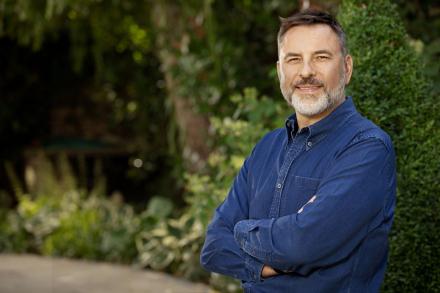
You actually physically went to a trench similar to the one John would have been in - I’m sure that was a really surreal experience for you?
I’d never been in a trench before. You don’t hear anything good about WW1. With and WW2 there’s loads of exciting movies - I’m sure it was hellish too, but it just feels like it was a different type of experience. WW2 is constantly revisited as entertainment, whereas WW1 just seems like misery, and so being in a trench gave me a sense of having to live in what was basically an enormous sewer. The day we went, it was pouring with rain, so I got some sense of the quagmire, and as much as you’re trying to fight, you’re also just trying to survive and get through the day
We’d love to hear about your reaction when you found out about your great-great-grandfather, William Haines, and how he was a travelling showman? And how entertaining actually runs in your family?
Well I was glad that there was some link, because obviously you are often thinking about what shaped you, why did you get drawn to certain things - being on stage, or trying to make people laugh, or writing stories Whatever it is. So, the fact that he was quite a flamboyant character and was a performer of sorts - I mean, he had an organ and a monkey and he used to play his organ on the streets, and the monkey would have a little hat and collect money. That is what his job was, so not quite the same as me, but he did something to entertain people. He seemed to be eternally optimistic - he was just winding up the organ, but said on a form he was a professional musician, which makes you think he might have played the violin in an orchestra! And to become part of the travelling community - and become a showman, that’s quite something, because it’s a closed world as it’s passed on from generation to generation.
Do you think any of these ancestors might help inspire a future book or TV project?
Not an immediate one, but you never know. I have written books that have touched upon aspects of my family life before. Gangsta Granny was slightly inspired by my grandma, Grandpa’s Great Escape was inspired by my grandpa, so it’s not impossible, but I don’t have an idea right now. I do think that the past is an exciting place, and it always throws up interesting ideas for stories. My new book is set in WW2, and I’ve had other books set in the past - I’ve done one set in Victorian times, I’ve done one in the 1930s, and it’s great, it really energises your imagination. So it may be that something comes from that. Certainly the world of travelling showmen and travelling fairgrounds, that world, or circuses and stuff, is a very rich one for children’s books. WW1 has obviously been covered brilliantly by someone like Michael Morpurgo, but it feels like a very serious subject and not necessarily one I would tackle - there’s not much humour in it, but who knows. Maybe one day.
How did you find showing a more serious side of yourself on camera?
I didn’t mind it. I think the thing is you just have to be yourself, because if you start acting it’s going to look really corny and stupid. I’ve been in situations before, doing documentaries - swimming the Thames or the Channel, going on trips to Africa with Comic Relief. You just have to relax and stop thinking you’re on camera, and just be, and let them capture it.
If you had to sum up, what would be the key take-away from the experience?
There’s stories everywhere, fascinating stories, and you just have to do your best to uncover them. I always say to kids when I go into schools, when they ask me about Gangster Granny or Grandpa’s Great Escape, to ask their grandparents questions, because I bet they had exciting lives before the kids were born. If you don’t ask, you never find out these stories, and then they become lost. I think it really reinforced that. We’re so used to living in the moment, and just being obsessed with what’s right in front of us at that moment - on our phones or television screens. Every family has interesting stories, and you just need some patience and time to find them out - and you learn a lot.
Making it human history always makes it more interesting. Something like WW1, you often hear lots of facts and figures about how many people died in this battle or that battle. I remember learning at school about it, and it was this battle this many people died, and this happened, and it feels very abstract to you. When you boil it down to one person’s life, to a human story, the history becomes very real.
I’m glad there weren’t any ‘baddies’ in my family, because I remember Jack Whitehall found out his ancestors were all horrible. Fortunately, I didn’t have a story like that so I was relieved!
interview supplied by BBC.



